A trip to Lăng Cô Beach in central Việt Nam can stir your soul and rekindle your romantic spirit, Bùi Quỳnh Hoa discovers.
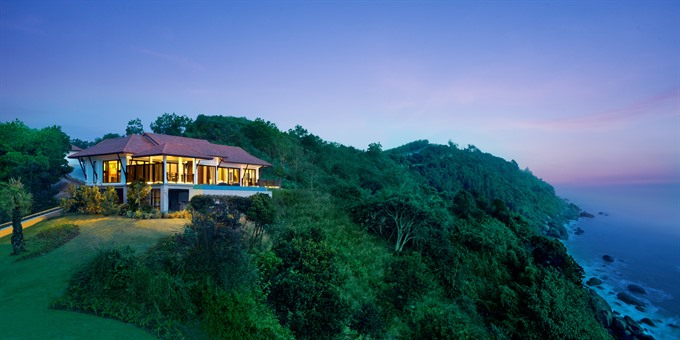
Serene beauty: A romantic sunset at Lăng Cô . — Photo courtesy of Thừa Thiên-Huế Portal
Midnight is an odd time to arrive at a beautiful beach.
It had taken a two-hour flight from Hà Nội and an hour’s drive from Đà Nẵng airport to the Lăng Cô Beach Resort, but we were in thrall.
The bay was glimmering golden in the light of a full moon. Thousands of stars twinkled in the high sky, playing some kind of lighting game with the thousands of lamps of fishing boats anchored on the shore. It was cool and fresh, and most importantly, there were no mosquitoes to distract us from our awestruck contemplation of the scene before us.
We could not resist entering the cool water, and many little fish seemed to want to play with us as we enjoyed the night swim.
My husband, Dương Cường Quốc, was overcome. “Swimming the moonlight with the fish and stars for company makes me feel part of a huge, live canvas that nature is painting on,” he gushed.
When we returned to the resort after many oohs and aahs, the chicken rice porridge mixed with green beans and lotus seeds that was served for supper was super delicious and refreshing. We were already in love this beach, and could not wait till we could see it in the morning light.
Lăng Cô Bay in daylight does not disappoint.
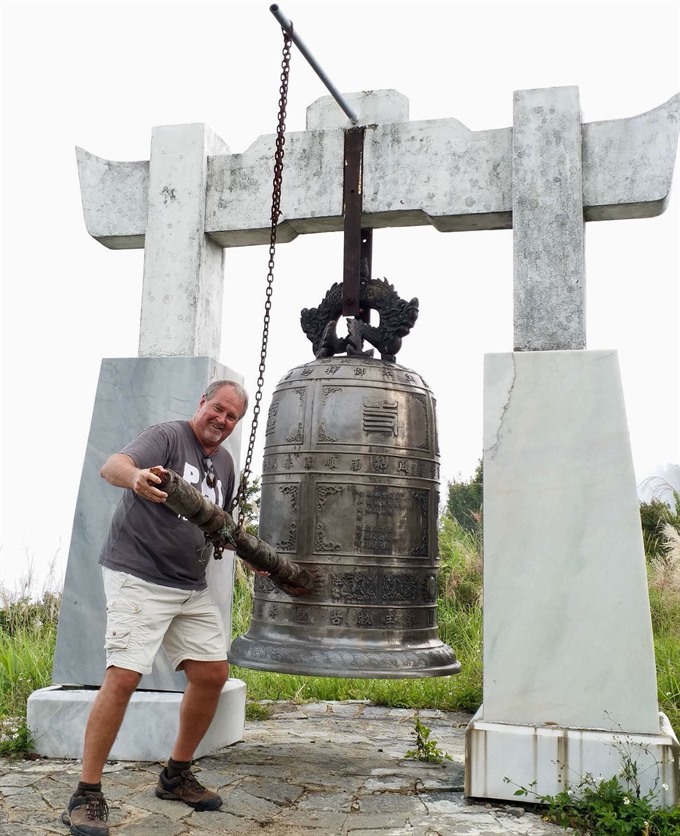
Announcing your arrival: A foreign visitor rings a huge bell at the Bạch Mã National Reserve.— VNS Photo Bùi Quỳnh Hoa
Its smooth white sand and wild flowers have charmed people from all walks of life, kings and colonialists included, for centuries. And recently, it was included in the list of the World’s Most Beautiful Bays (otherwise known as the Worldbays Club). It is Việt Nam’s third bay after Hạ Long and Nha Trang, to be admitted to the club.
Lăng Cô’s first royal lover was King Khải Định (1916-1925), known as the most travel-lusty monarch under the Nguyễn Dynasty (1802-1945).
He "discovered" the bay and founded a village in the area in 1916. He was so moved by the beautiful view that he wrote a poem that was carved on a stone now preserved in An Cư Đông Village. He also issued a decree asking the Ministry of Public Works to build a summer palace for him here.
During the Nguyễn Dynasty’s reign, the bay, which lies between the Hải Vân Pass and a branch of the Trường Sơn Mountain Range, was called Làng Cò (Village of Storks) for obvious reasons.
When French colonists first visited the area, they mispronounced the name and changed it to Lăng Cô.
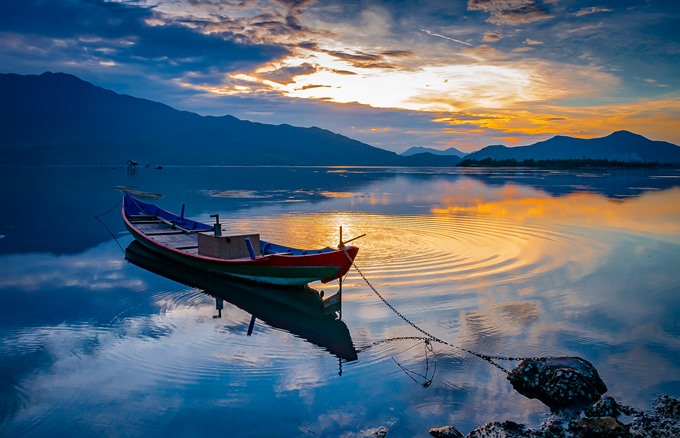
Enchanting: Sunset at Lập An Lagoon. — Photo Trần Như Đăng Tuyên
Dancing sun
We were up early and at the beach, not wanting to miss the sunrise which we expected to be breathtaking. It was. As its first rays began dancing on the turquoise waters and sweeping the smooth white sands, the coconut trees and corals, and climbed languidly over a seemingly endless mountain range that bordered our gaze, we felt blessed.
The beach was quiet, with very few people strolling along it. We could not but take many pictures, although the scene has been printed in my mind forever.
A friend had told me that our trip would be incomplete without a personal discovery of the Lập An Lagoon. So we headed there in the afternoon, banking on an impressive sunset, and our expectations were exceeded with consummate ease.
The setting sun painted the 800ha lagoon in pink, purple and dark blue colours, having us rubbing our eyes in wonder bordering on disbelief.
In the distance, on a sand dune stretching from the bank of the lagoon almost to its middle, some couples were posing for pre-wedding photographs. They would have some unforgettable pictures, for sure.
My brother-in-law, Dương Hồ Quang, an experienced traveler, said this trip had presented him with some of the most impressive sights he’d ever seen.
“Our country is so beautiful and romantic, and I feel there is so much here that I have not discovered, both landscapes and different cultures,” he said.
“I usually plan to visit each place just once so that I can use my free time to see new places, but I have to make an exception for Lăng Cô. I have to return. And not just once.”
Free, carefree
Another place we “discovered” and explored on this trip was the Bạch Mã (White Horse) National Park.
The reserve has everything that an idyllic resort needs: beautiful high peaks, big waterfalls, tropical rainforest, unique trees, and a cool climate. The 22,000ha reserve is home to 1,700 species of animals and 2,400 different kinds of trees.
It is a great place for camping, swimming in the streams, watching birds, exploring mysterious old colonial villas as well as a national historical relic, the Bạch Mã tunnels.
We trekked to Hải Vọng Đài (Sea Watching Tower) on the highest peak of the Bạch Mã mountain range at 1,450m above sea level. We was a bit tired, but the view was well worth the effort.
“I really love this place,” said Frits Jansen of Holland, a visitor we ran into.
“I’ve come here several times but I keep wanting to come back. The nature’s magnificent, and the climate perfectly cool.”
We returned to the bay at around 4pm. Exhausted after a whole day of trekking, we relaxed with some snacks and fruits before joining the cool waves.
Lying on the white smooth sand, I admired the stretch of endless blue dotted with tiny boats. Far away, the horizon was decorated with white wings of storks flying over the water and clouds that seemed to melt into the sea. For a few moments, I soared with the birds, free and carefree.
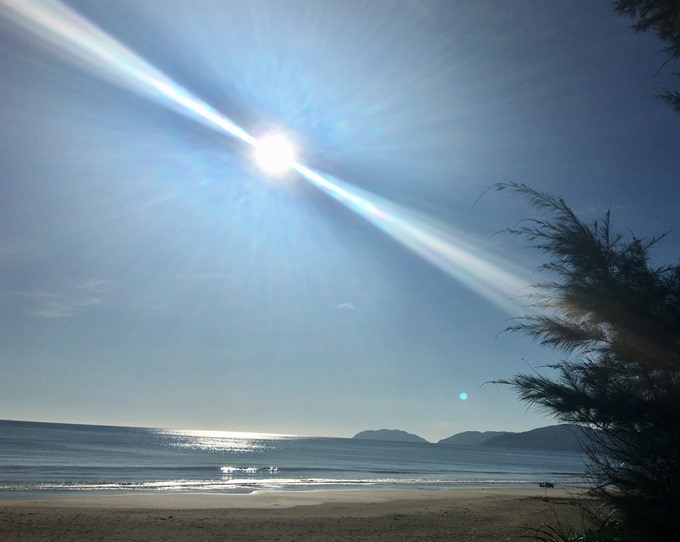
Into the shining sun: A new day breaks over a pristine blue sea. — VNS Photo Bùi Quỳnh Hoa
Historic relics
The next day, we drove along the breathtaking Hải Vân Pass, which is of strategic importance in Việt Nam’s history, to the Hải Vân Gate on the border of Thừa Thiên-Huế Province and Đà Nẵng City.
This route winds its way along the densely forested Bạch Mã Mountain, offering glimpses of Lăng Cô Beach that looks pristine from up above.
Hải Vân Gate, which was recognised as a national historical relic recently, stands on top of the pass. It’s a complex dating back to the Trần Dynasty (1470). Octagonal bunkers bridge ancient history with the French colonial period.
After listening to some historical stories about the gate, I turned to nearby souvenir shops to buy pearl necklaces and bracelets, as special gifts from the sea.
Other gifts from the sea that we enjoyed a lot have to be mentioned. Lăng Cô abounds with fishes, lobsters, shrimp, crabs, sea snails, oysters and clams, and we had our fill. One dish that stood out for me was canh ghẹ nấu mùng tơi (small crab soup with basella alba vegetable), served with salted white baby eggplants at the Lăng Cô Beach Resort.
“We are happy to see you enjoy our land and specialities,” said Hà Thanh Hải, general director of the resort.
“Please consider this your second home, and we will be very happy to welcome you home, every time.”
Dinner on floating restaurants on the lagoon was also memorable. Cheap, tasty tropical fruits proved to be another local attraction.
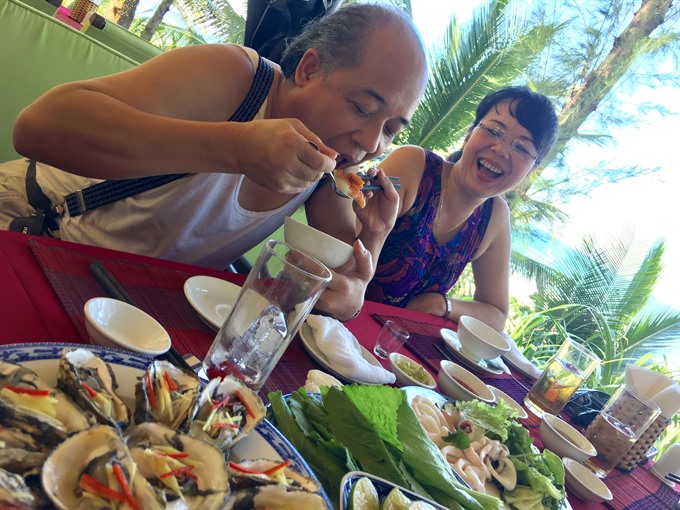
The way to his heart: Local specialties served at the Lăng Cô Beach Resort were delicious. — VNS Photo Bùi Quỳnh Hoa
Tourism gains
Lăng Cô is situated in a zone that comprises three World Heritage Conservation Centres, including the ancient citadel in Huế, the old, picturesque Hội An Town, and the sacred Mỹ Sơn monuments.
Nguyễn Văn Cao, chairman of Thừa Thiên-Huế Province, said the number of visitors to Phú Lộc District, where the beach and the resort is located, has been increasing by an average of 30 per cent each year.
“The district has welcomed about 847,000 visitors this year. Tourism turnover is expected to reach VNĐ951 billion (about US$41.8 million) this year, an increase of 17.5 per cent compared to last year.
“The daily life of locals has also improved considerably, with a per capita income of VNĐ40.5 million (about $1,800) this year,” Cao said.
“In Lăng Cô alone, the province has licensed 14 development projects covering a planned area of 355 hectares.
“The province has created favourable conditions for investors to invest in Lăng Cô and build a tourism and culture triangle comprising Lăng Cô, Bạch Mã Reserve and Chân Mây Seaport.
“We are also strengthening collaboration with neighbouring provinces to turn Lăng Cô into a dynamic tourism centre.”
I was not sure what I felt about such plans. On the one hand, they would help locals, create jobs and so on, but on the other, the pristine, untouched nature of the place might be lost.
For now, back home in Hà Nội, I am deeply thankful to have seen and experienced the joy and elation people feel in the presence of great natural beauty.
It is a place that makes loving hearts beat as one. — VNS